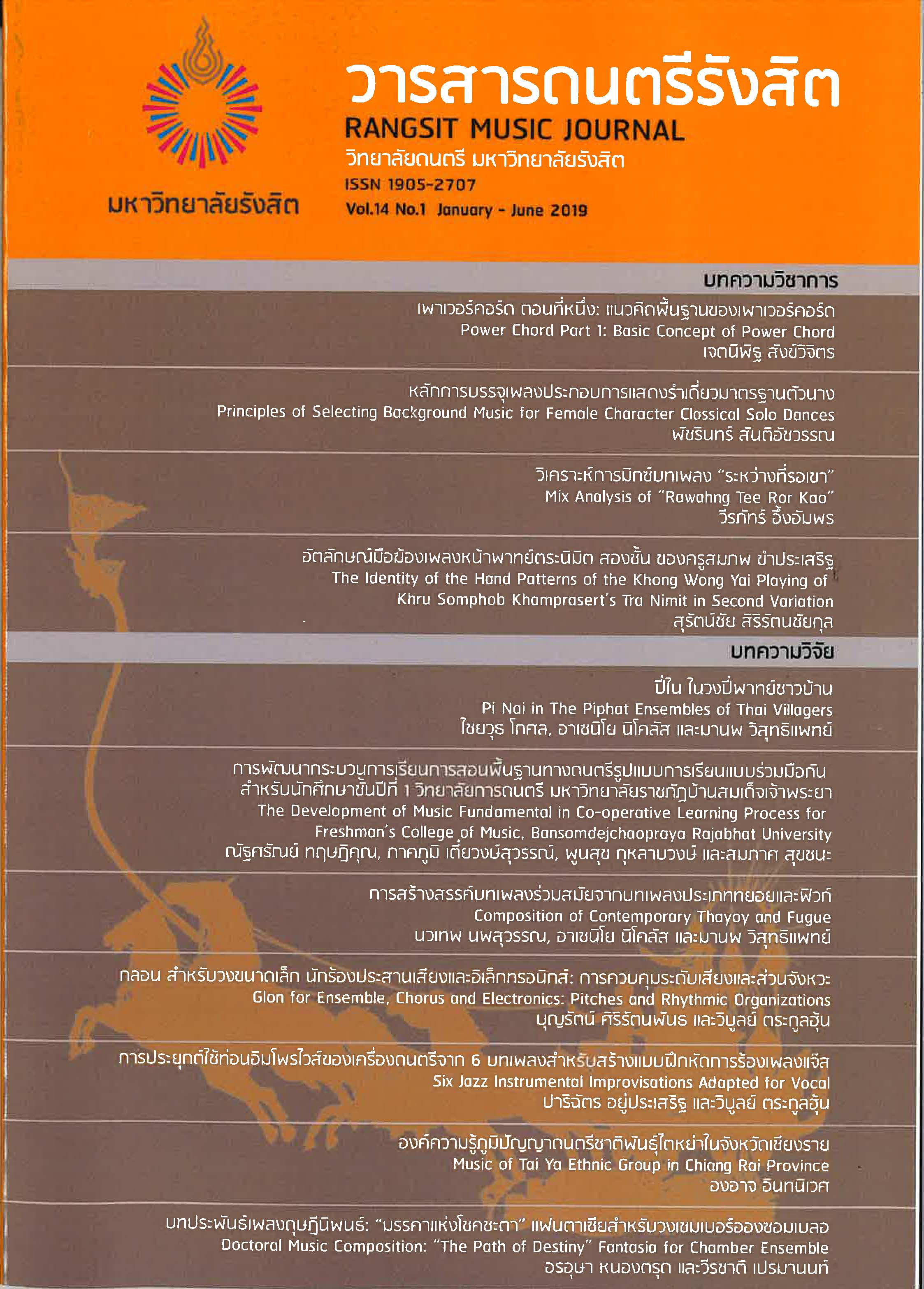The Development of Music Fundamental in Co-operative Learning Process for Freshman’s College of Music, Bansomdejchaopraya Rajabhat University
Keywords:
Music Fundamental Project and Workshop, Cooperative Learning, SociometryAbstract
The objectives of the study are 1) to develop students’ music fundamental through Co-operative Learning process, 2) to analyze and explore the results of practical and theoretical music fundamental for the students, gained from Co-operative Learning process, 3) to investigate the sociometry result from the development of music fundamental in Co-operative Learning process and 4) to allow students to experience Co-operative Learning process and realize the value of social relationships and positive interdependence in order to succeed in music studies. The results of the study show that students who have participated in the Co-operative Learning process possess positive results in both Thai and Western music studies practically and theoretically. A sample is selected from 60 students, whose study results increase to more than 80%. The high percentage clearly confirms that the Co-operative Learning process is successfully implemented on the freshmen, leading to the efficient practical development. Furthermore, the sociometry result from the Co-operative Learning process signifies the positive interdependence, resulting in the efficient music studies eventually.
References
2. ดิเรก วรรณเศียร. “MACRO model: รูปแบบการจัดการเรียนรู้สำหรับศตวรรษที่ 21.” สืบค้นเมื่อ 22 มิถุนายน 2559. http://regis.dusit.ac.th/images/news//1421308421MACRO %20รูปแบบการสอนสำหรับศตวรรษที่%2021.pdf.
3. นิลวรรณา อึ้งอัมพร. “กระบวนการพัฒนาทักษะความเปนนักดนตรีโดยใช้บทฝึกดนตรีเพื่อการเคลื่อนไหว.” วารสารดนตรีรังสิต 11, 2 (2016): 63-77.
4. สาขาวิชาดนตรีตะวันตก. เอกสารกรอบมาตรฐานคุณวุฒิระดับอุดมศึกษาแห่งชาติ (มคอ.2). กรุงเทพฯ: คณะมนุษยศาสตร์และสังคมศาสตร์. มหาวิทยาลัยราชภัฏบ้านสมเด็จเจ้าพระยา, 2554.
5. สำนักงานคณะกรรมการการอุดมศึกษา. “แผนพัฒนาการศึกษาระดับอุดมศึกษา” ฉบับที่ 11 (พ.ศ.2555-2559). สืบค้นเมื่อ 27 มิถุนายน 2559. http://www.mua.go.th/users/bpp/developplan/download/higher_eduplan/PlanHEdu11_2555-2559.pdf.
6. สุพรรณี ชาญประเสริฐ. “Active Learning: การจัดการเรียนรู้ในศตวรรษที่ 21” สวทช. 42, 188 (2557): 3-6.
7. Phyllis R. Kaplan and Sandra L. Stauffer. ดนตรีศึกษา : การเรียนแบบร่วมมือกันในวิชาดนตรี. [Cooperative Learning in Music] (ศักดิ์ชัย หิรัญรักษ์, ผู้แปล). เอกสารประกอบการเรียนการสอน หลักสูตรศิลปศาสตรมหาบัณฑิต (ดนตรี) แขนงวิชาดนตรีศึกษา. นครปฐม: วิทยาลัยดุริยางคศิลป์ มหาวิทยาลัยมหิดล. มปป.







